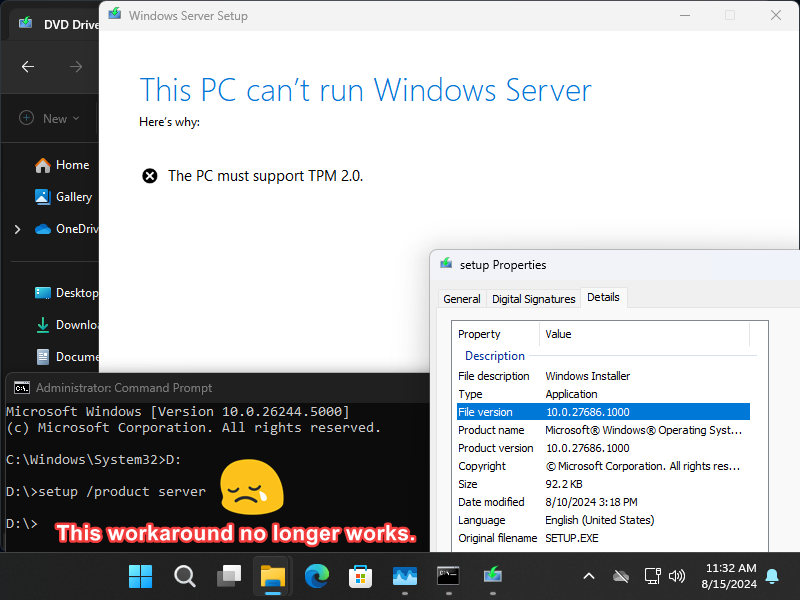
Many users with officially unsupported PCs could successfully install Windows 11 using a 'trick' that circumvents its hardware requirement verification process with a '/product server' command line. It gave many older PC owners a new lease of life as they could migrate towards the latest operating system, as the older ones were no longer supported and were prompted to upgrade. However, Bob Pony quickly found that Microsoft had patched this trick in the latest Canary Build, prompting the need for the TPM (Trusted Platform Module) 2.0 protocol.
Pony confirmed that the current Windows 11 24H2 works fine with the bypass, though that may not be the case for long. Alas, the joy of using Windows 11 on officially unsupported PCs may end as Microsoft rolled out a patch in its Windows 11 Insider Build 27686 (Dilithium) that effectively blocks this trick.
This command has been used for almost a year, enabling many users to upgrade from earlier Windows versions effortlessly. While there are other methods, some were patched- such as the PopCnt restriction implemented a few months ago. Until then, many could use Windows 11 on PCs using a wide range of older CPUs like the obsolete Athlon & Core2Duo. Though the PopCnt restriction was patched, the TPM and Secure Boot check could still be bypassed. This bypass is a simple command line that can be executed only during the OS installation process that permanently skips the hardware check, including the TPM and RAM verification.

It was helpful as many PCs could efficiently run Windows 11 but couldn't with requirements such as the TPM 2.0 protocol not being available in older systems. Even if one uses an add-on module, Windows 11 CPU compatibility begins from Intel 8th-gen and AMD Ryzen 2nd-gen CPUs. Installing a TPM chip wasn't possible on notebooks. For many users, these CPUs are far from obsolete. However, Microsoft has been quick to phase out older operating systems, and many prefer to move to the latest one.
Not surprisingly, Microsoft hasn't mentioned this patch and removed this bypass ability. Though this was found in the Canary Build, this will likely trickle down to future releases and be implemented for all systems once updated. This would force such users to switch to other operating systems, including Windows 11 LTSC Enterprise edition, whose CPU compatibility list starts from two-core CPUs with 1 GHz clock speed, with TPM 2.0 optional.
While there are other installation methods, it's simply a matter of time before Microsoft patches these bypasses. In this situation, users can switch to older Windows 10 with supported builds, shift to Linux, or make a hardware upgrade.







